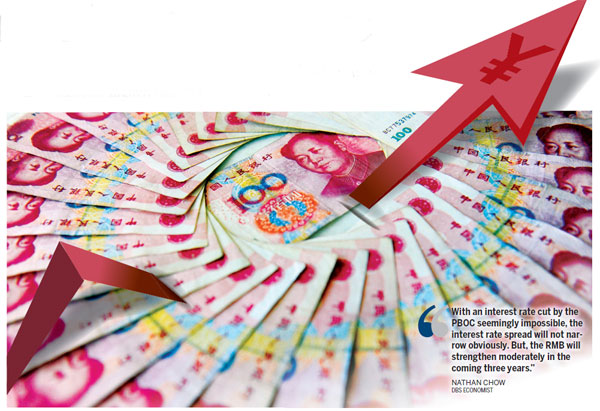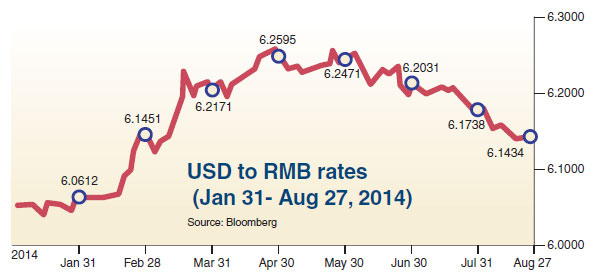Yuan gathers steam as stock connect launch nears
Updated: 2014-09-11 09:03
By Gladdy Chu(HK Edition)
|
|||||||
RMB tipped to strengthen over next three years with surge of capital inflow into the SAR, pushing the exchange rate higher, Gladdy Chu reports
The yuan has shown signs of stabilizing recently, with investors anticipating a return of the currency's appreciation trend on a recovering economy and expectations of increased capital inflow.
The spot yuan was traded at 6.1434 to the greenback on Aug 27 - appreciating by 1.68 percent since early June.
The yuan's strength has been gaining momentum following April's announcement of the Shanghai-Hong Kong Stock Connect scheme. Now in its testing stage, the scheme is due to be launched in mid-October, allowing global investors - institutional and retail - to trade Shanghai "A" shares, and mainland investors to trade Hong Kong H-shares via the Hong Kong Stock Exchange for the first time.
The program is expected to spark a surge in capital inflow, given the relatively low stock prices of blue chip companies. In the second quarter, the yuan's role in business has strengthened significantly while RMB products have gained popularity.
In its latest report, Development Bank of Singapore (DBS) said a greater number of companies has chosen to convert Hong Kong dollars into yuan. It also showed that the proportion of companies putting their RMB back into deposit accounts had risen substantially to 54 percent in the second quarter of this year - up from 38 percent in the first quarter.
Greater need for RMB
Companies expect the yuan to appreciate further in the near term, and they might be foreseeing a greater need to use the yuan in their operations amid a stabilizing RMB exchange rate. "The yuan should climb to 6.07 to the dollar by the end of this year," predicted DBS economist Nathan Chow.
Besides, the Shanghai-Hong Kong Stock Connect is likely to increase the volatility of the Chinese currency.
A month before the Shanghai-Hong Kong Stock Connect scheme was revealed, Beijing doubled the size of the RMB's daily trading band. Corporations have taken on various hedging strategies to mitigate the corresponding increase in exchange rate volatility, and interest in RMB hedging products shall continue to pick up.
HSBC Bank (China) launched a series of products in early August with various RMB options to help corporate clients hedge foreign exchange risks. In Hong Kong, the total trading volume of currency futures hit 13,903 contracts in July - an increase of 53 percent from a year earlier - according to the Hong Kong Stock Exchange's latest report.
Although the yuan exchange rate is certain to be affected by the Stock Connect program, it still depends on the economic fundamentals to a large degree, especially the trade balance and interest rate spread versus the greenback. Although market analysts have reached a general consensus on the yuan's two-way fluctuation, they differ on what the actual trend would be.
Peng Wensheng, chief economist of China International Capital Corporation Limited, said in his latest report: "With the economic recovery in the US and China's economic slowdown, the constriction of interest rate spread will cause possible depreciation of the RMB."
However, Chow said: "Not until the second half of next year will the Fed raise interest rates. With an interest rate cut by the PBOC (People's Bank of China) seemingly impossible, the interest rate spread will not narrow obviously. But, the RMB will strengthen moderately in the coming three years."
Renminbi activities in Hong Kong are supported by the city's renminbi liquidity pool - the largest outside the mainland. By late 2013, total renminbi customer deposits and certificates of deposit issued by banks in Hong Kong had exceeded one trillion yuan. By June this year, yuan deposits in the SAR amounted to between 9,000 billion yuan ($1,465 billion) and 1 trillion yuan. DBS predicts that the figure will rise to 1.3 trillion by the end of this year.
Higher offshore yuan rate
"When the (Stock Connect) scheme starts, Hong Kong investors' purchase of 'A' shares and the growing demand for RMB will exert certain pressure on the yuan cash pool. However, the surplus of RMB inflow surpassing outflow would mean such pressure would be temporary," Chow noted. "The offshore RMB exchange rate will be higher, and will make more RMB capital stay in Hong Kong."
According to a DBS research report released on Aug 20 this year, while the Shanghai-Hong Kong Stock Connect program will promote two-way capital flow, valuation-driven equity flow can, at times, be significantly imbalanced. Given Hong Kong's limited liquidity pool of up to one trillion yuan, its RMB market is vulnerable to a liquidity squeeze. Against this background, it is understandable that the Hong Kong Monetary Authority intends to relax the daily conversion cap for Hong Kong residents (of 20,000 yuan) in the near future. Relaxation of the daily conversion cap will, in turn, spur RMB product innovation and boost demand for sophisticated RMB products. This, alongside other policy refinements, would increase Hong Kong's RMB liquidity pool.
The offshore RMB cash pool is about 1.6 trillion yuan in total - amounting to just 1 percent of China's M2, compared with 30 percent in the US. "There's still much room for the development of more clearing centers," Chow added.
Contact the writer at gladdy@chinadailyhk.com


(HK Edition 09/11/2014 page9)